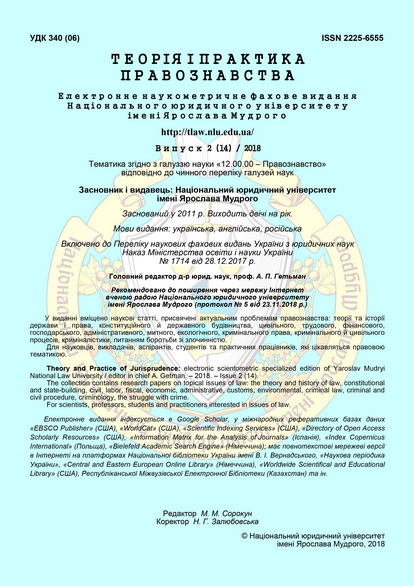Self-regulatory activity in the sphere of business: task of economic legal supply
DOI:
https://doi.org/10.21564/2225-6555.2018.14.149728Keywords:
co-regulation of economic activity, self-regulation of economic activity, economic activity, government regulation, consumers of goods and services, benchmarking, kind of regulationAbstract
The article gives an interpretation of the concept of «self-regulation of economic activity», its legislative framework is established. The correlation of concepts of «self-regulation of economic activity» and «co-regulation of economic activity» is considered. It is proved that co-regulation and self-regulation are more flexible types of regulation of economic activity in comparison with state regulation, since they activate and involve the process itself directly by the participants of economic activity and consumers of goods and services. It is established that the investigated mechanisms have common and distinctive characteristics.
The development and deepening of the functional load of self-regulatory organizations is an indisputable trend in the development of organizational and economic relations in the national economic system, and consequently the legislator's efforts must deliberately aim at modernizing the relevant legislative framework, given that the socio-economic need in this is over.
It is stated that self-regulation is one of the key tools of effective regulatory policy. This is due to the disadvantages of the current state regulation system, which, in turn, leads to the fact that enterprises spend considerable resources to ensure compliance with outdated or too strict norms, while the state loses money in support of an ineffective control system that often has a repressive and negative attitude pours into the business climate. Consequently, the mechanisms of self-regulation of economic activity should receive a detailed legislative regulation, including the motives for an effective regulatory policy of the state.
The legislator is faced with the task of creating the legal basis for the establishment and functioning of self-regulatory organizations, which should be separately enshrined in the Commercial Code of Ukraine in the section dedicated specifically to this issue, which should include, in particular, the legal conditions of creation and the organizational and legal form of self-regulatory organizations, the grounds and procedures for the delegation of state powers to these organizations, the abolition of this delegation, the creation of special funds, rule-making activities, etc.
On the basis of the norms of the Commercial Code of Ukraine, special legislation ofUkraineon the functioning of self-regulatory organizations in various spheres of economic activity should be create.
References
Honcharenko, O. (2016). Konstytutsiini zasady samorehuliuvannia hospodarskoi diialnosti. Zovnishnia torhivlia: ekonomika, finansy ta pravo, 1, 28–36 [in Ukrainian].
Filatova N. Yu. Poniattia ta oznaky samorehulivnykh orhanizatsii. Visnyk Akademii pravovykh nauk Ukrainy. 2013. № 1. S. 280–290. [in Ukrainian].
Kochyn, V.V. (2014). Poniattia ta oznaky samorehuliuvannia u tsyvilnomu pravi Ukrainy. Yurydychna Ukraina, 10, 52–55 [in Ukrainian].
Tkachuk, P. (2005). Zastosuvannia pryntsypu verkhovenstva prava sudamy konstytutsiinoi ta zahalnoi yurysdyktsii. Visnyk Konstytutsiinoho Sudu Ukrainy, 5, 94–101 [in Ukrainian].
Shylinhov, B.C. (2009). Verkhovenstvo prava – osnovopolozhnyi pryntsyp pravovoi system. Chasopys Kyivskoho universytetu prava, 2, 26–29 [in Ukrainian].
Krupchan, O.D. (2014). Publichno-pravove ta pryvatno pravove rehuliuvannia pidpryiemnytstva v Ukraini. Biuleten Ministerstva yustytsii Ukrainy, 3, 150–157 URL: http://nbuv.gov.ua/UJRN/bmju_2014_3_36 [in Ukrainian].
Rehuliatorna polityka: Novi mozhlyvosti. K. Liapina (Ed.). (2004). Kyiv: In-t konkurentnoho suspilstva [in Ukrainian].
Ponomarova, L.S. (2007). Biznes-asotsiatsii v Ukraini yak sub’iekty rehuliatornoi polityky ta samoorhanizatsii pidpryiemnytstva. URL: http://www.kbuapa.kharkov.ua/e-book/db/ 2007-1- 1/doc/2/15.pdf [in Ukrainian].
Simpson, R., Synkova, O.M. (2004). Rehuliuvannia posluh zahalnoho interesu v EC. Odesa: ONIuA, 35–36 [in Ukrainian].
Yavorska, T.V. (2012). Samorehuliuvannia u strakhovomu pidpryiemnytstvi Ukrainy. Formuvannia rynkovykh vidnosyn v Ukraini, 2, 106–109 [in Ukrainian].
Zalietov, O.M. (2013). Sutnist i pryntsypy samorehuliuvannia na strakhovomu ryynku. Visnyk ZhDTU. Seriia: Ekonomichni nauky, 2 (64), 235–238 [in Ukrainian].
Dobrovolska, V.V. (2005). Derzhavne rehuliuvannia ta samorehuliuvannia u sferi pidpryiemnytstva. Aktualni problemy derzhavy i prava, issue 25, 302–305 [in Ukrainian].
Interinstitutional agreement on better lawmaking (2003/C 321/01). URL: www.legislationline.org/.../EU%20Interinstitutional%20Agre.
Self-Regulation Mapping Exercise Report July 2009. (2009). URL: http:// ec.europa.eu/health/ph_determinants/life_style/ alcohol/Forum/docs/regulation_en.pdf.
Honcharenko, O. (2017). Samorehuliuvannia ta spivrehuliuvannia hospodarskoi diialnosti. Pidpryiemnytstvo, hospodarstvo i pravo, 9, 62–66 [in Ukrainian].
Zadykhailo, D.V. (2012). Hospodarsko-pravove zabezpechennia ekonomichnoi polityky derzhavy. Kharkiv: Yurait [in Ukrainian].
Downloads
How to Cite
Issue
Section
License
Copyright (c) 2018 Theory and practice of jurisprudence

This work is licensed under a Creative Commons Attribution 4.0 International License.




